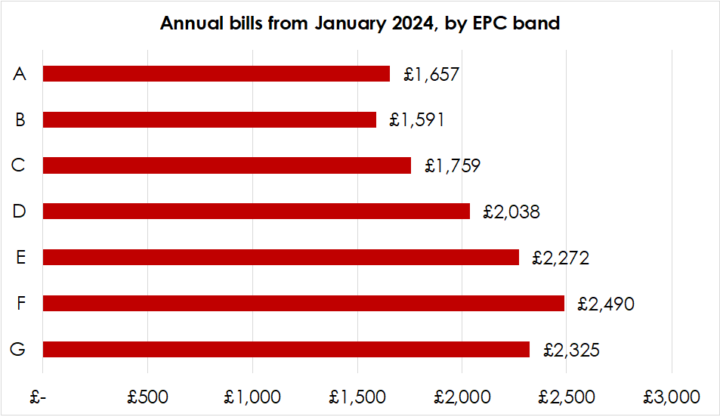Energy bill price cap: poorly insulated homes to cost over £400 more to heat next year
When gas and electricity costs are taken together, the least energy efficient homes will cost over £700 extra.

By George Smeeton
info@eciu.netShare
Last updated:
Under Ofgem’s price cap from January 2024, gas bills in homes with poor insulation, rated band F on the Energy Performance Certificate (EPC) scale, will be on average £415 (50%) a year worse off than homes at the Government’s target for home energy efficiency of EPC band C, new analysis from the Energy and Climate Intelligence Unit (ECIU) has found. [1]
With the gas crisis also inflating power prices, when gas and electricity are taken together, the worst rated homes will cost around £730 (42%) more than EPC band C homes.

Whilst households living with the worst energy efficiency are facing the highest bills, even those in an average home, EPC band D, are facing bills of around £280 more than if they had been upgraded to the Government’s target of band C.
Jess Ralston, Energy Analyst at ECIU, said: “For millions of people living in leaky homes, 2024 will mean being colder and poorer. The real kick in the teeth is that existing Government insulation schemes started to flatline just as the gas crisis caused bills to soar, despite having worked well in the past. There was an opportunity to boost energy efficiency in the Autumn Statement, but it was not even mentioned, and the PM’s recent decision to scrap insulation requirements for landlords means renters are now locked into higher energy bills for years to come.
"Investing in insulation rather than simply subsidising gas bills over the gas crisis could have shielded households from future volatility in gas prices. And it would bring more energy independence as it reduces our reliance on gas imports. Instead, gas prices are set to stay two to three times higher for the rest of the decade, and we’re still vulnerable to interference from figures like Putin. Many people will be wondering what the UK’s approach is to energy security and lowering bills, because at the moment, the plan seems confused at best.”
On average, total energy costs are set to be around 1.7x the level in summer 2021 before the gas crisis [2]. Households will also be worse off as the Government’s £400 Energy Bill Support Scheme has come to an end.
Insulation rates over the last decade have been 90% lower than their peak of 2.3 million measures per year in 2012, coinciding with then Prime Minister David Cameron deciding to “cut the green crap”, and were just 95% of that level at 160,000 in 2022. So far in 2023, only 100,000 measures have been installed, so 2023 could see even lower numbers in total [3].
Notes to editors:
- ECIU analysis uses prices under Ofgem’s price cap for January 2024. Final values for the whole year are not yet known, but are forecast to be similar or only slightly lower than these Q1 values. Data for gas and electricity consumption are median values for homes in each EPC band. Note also that band F homes have higher energy use than worse rated EPC band G homes because these EPC G homes often include the secondary heating sources (such as a biomass boiler).
- Comparisons with previous bills are based on a pre-crisis average price cap dual fuel bill of just over £1,100 for the period January 2019 to September 2021.
- Household Energy Efficiency Statistics, September 2023.
For more information or for interview requests:
George Smeeton, Head of Communications, ECIU, Tel: 07894 571 153, email: george.smeeton@eciu.net